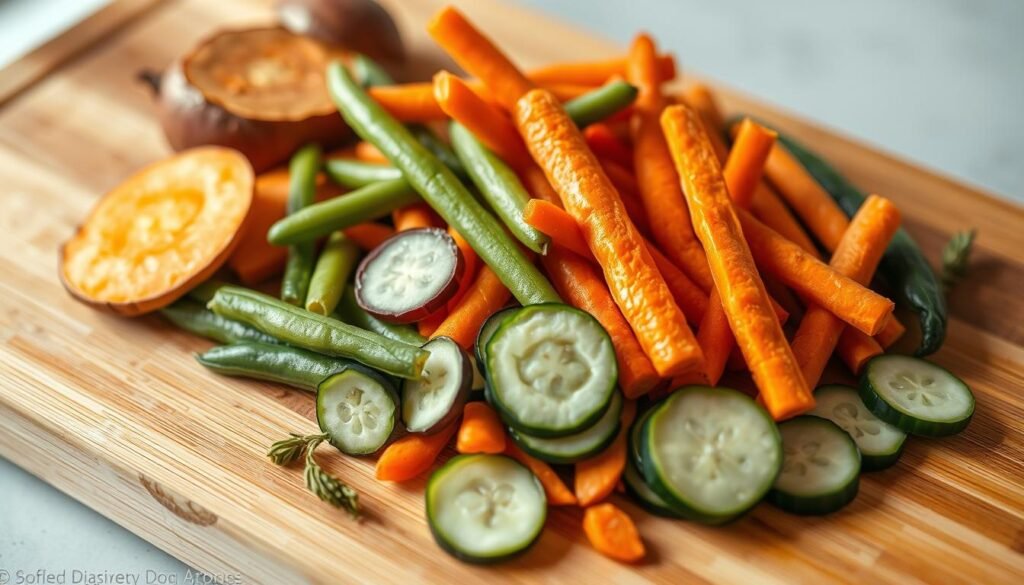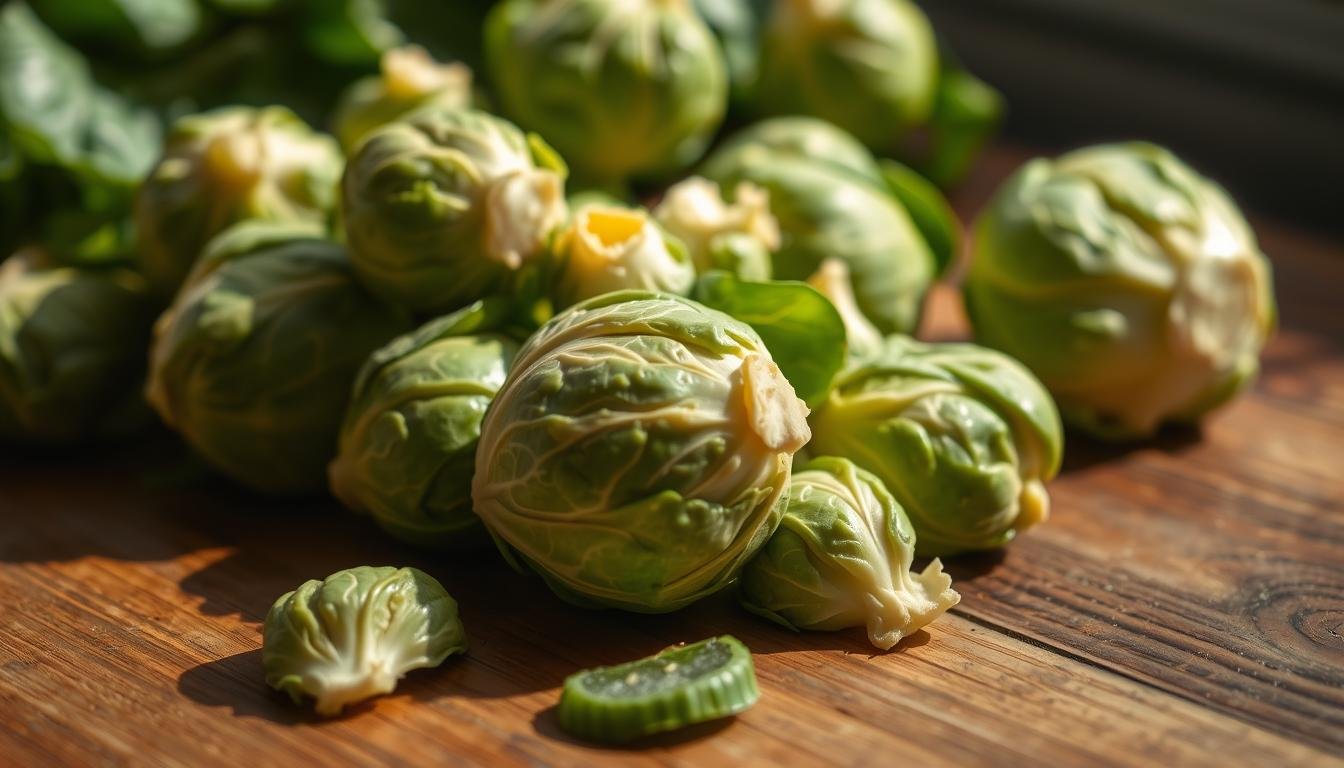As pet owners, we often wonder about the safety of sharing our favorite foods with our furry companions. One question that frequently arises is whether certain vegetables, like Brussels sprouts, are suitable for pets. These small, nutrient-packed greens are a staple in many human diets, but are they safe for your four-legged friend?
Before introducing any new food into your pet’s diet, it’s crucial to consult with a veterinarian. Brussels sprouts, when prepared correctly, can be a healthy addition to your dog’s meals. However, improper preparation or overfeeding can lead to digestive issues such as gas or bloating. Understanding the benefits and precautions is key to ensuring your pet’s well-being.
This article will explore the nutritional advantages of Brussels sprouts, how to prepare them safely, and the potential risks to watch out for. By the end, you’ll have a clear understanding of how to incorporate this vegetable into your dog’s diet responsibly.
Key Takeaways
- Always consult a veterinarian before introducing new foods to your pet’s diet.
- Brussels sprouts are safe for dogs when cooked and served in moderation.
- Proper preparation helps avoid digestive issues like gas or bloating.
- Monitor your pet for any adverse reactions after feeding Brussels sprouts.
- These vegetables provide essential vitamins and fiber when included correctly.
Understanding the Nutritional Benefits of Brussels Sprouts
These small green vegetables are a powerhouse of vitamins and minerals. They provide essential nutrients that support overall well-being and contribute to a balanced diet. When prepared correctly, they can be a valuable addition to your pet’s meals.
Vitamin and Mineral Profile
Brussels sprouts are rich in vitamin C, which boosts the immune system and reduces inflammation. They also contain vitamin K, essential for bone health and blood clotting. Additionally, they provide vitamin A, supporting healthy skin and a glossy coat.
Minerals like potassium and manganese are also present. These nutrients support brain, muscle, and heart functions. The fiber content aids digestion, promoting healthy bowel movements and preventing constipation.
Antioxidant Properties and Health Boosts
Antioxidants in Brussels sprouts, such as kaempferol, protect cells from damage caused by free radicals. This helps combat oxidative stress and reduces the risk of chronic diseases. The vegetable’s low-calorie and low-sugar content make it suitable for pets needing weight management.
However, the high fiber content can lead to gas production. To manage this, serve Brussels sprouts in moderation and monitor your pet’s reaction.
| Nutrient | Amount per 1 Cup (Raw) |
|---|---|
| Vitamin C | 76.5 mg (85% DV) |
| Vitamin K | 159 mcg (132% DV) |
| Fiber | 3.5 g |
| Potassium | 350 mg (7% DV) |
How to Prepare Brussels Sprouts Safely for Your Dog
Ensuring your pet’s safety starts with proper food preparation techniques. Brussels sprouts can be a healthy addition to your pet’s diet, but only when prepared correctly. The right cooking methods and seasoning choices are crucial to avoid any risks.
Cooking Methods: Steaming and Roasting
Steaming is one of the best ways to prepare Brussels sprouts for your pet. It retains most of the nutrients while making the vegetable easier to digest. Simply steam them for 5-10 minutes until they are fork-tender.
Roasting is another excellent option. Preheat your oven to 425℉ and roast the sprouts for 25-40 minutes. This method enhances their natural flavor without adding harmful ingredients. Always let them cool before serving.
Tips to Avoid Harmful Seasonings
While humans enjoy richly seasoned dishes, pets require simpler preparations. Avoid adding garlic, onions, or salt, as these can be harmful. Stick to plain, unseasoned Brussels sprouts to ensure your pet’s safety.
Cutting the sprouts into small, bite-sized pieces is also essential. This reduces the risk of choking and makes it easier for your pet to digest. Always monitor your pet after introducing new foods to their diet.
By following these steps, you can provide your pet with the benefit of Brussels sprouts while keeping them safe. Remember, moderation is key to maintaining a healthy and happy good dog.
Can Dogs Eat Brussel Sprouts? Exploring Safety and Moderation
When considering new foods for your pet, understanding portion control is essential. Brussels sprouts can be a healthy addition to your pet’s diet, but only when served in the right amounts. Overfeeding can lead to digestive issues, while proper portions ensure your pet reaps the benefits.
Portion Guidelines for Different Dog Sizes
The amount of Brussels sprouts your pet can safely consume depends on their size and weight. Smaller breeds should start with just a tiny piece, while larger breeds can handle slightly more. Here’s a general guideline:
| Dog Size | Portion Recommendation |
|---|---|
| Extra-Small (under 10 lbs) | 1/2 sprout |
| Small (10-25 lbs) | 1 sprout |
| Medium (25-50 lbs) | 1-2 sprouts |
| Large (50-100 lbs) | 2-3 sprouts |
| Extra-Large (over 100 lbs) | 3-4 sprouts |
Feeding in Moderation to Prevent Digestive Issues
Moderation is key when introducing Brussels sprouts to your pet’s diet. These vegetables are high in fiber, which can cause gas or bloating if consumed in excess. Start with small portions and gradually increase if your pet shows no adverse reactions.
Always monitor your pet after introducing new foods. If you notice signs of discomfort, such as excessive gas or changes in bowel movements, reduce the portion size or consult your veterinarian. For more detailed guidance, check out this comprehensive resource on safely feeding Brussels sprouts to pets.
By following these guidelines, you can ensure your pet enjoys the nutritional benefits of Brussels sprouts without any risks. Remember, a balanced diet and proper portioning are essential for your pet’s health and happiness.
Potential Digestive Reactions in Dogs

Introducing new foods to your pet’s diet requires careful attention to their digestive response. Brussels sprouts, while packed with nutrient benefits, can sometimes lead to discomfort if not introduced properly. Understanding these reactions helps ensure your pet stays healthy and happy.
Managing Gas and Bloating
Brussels sprouts contain raffinose, a carbohydrate that can cause gas and bloating in pets. To minimize these effects, start with small portions and gradually increase the amount. Steaming or roasting the sprouts can also make them easier to digest.
Here are some tips to manage digestive issues:
- Serve Brussels sprouts in moderation as a treat.
- Monitor your pet’s reaction after each meal.
- Consult your veterinarian if discomfort persists.
Recognizing Signs of Discomfort
It’s important to watch for signs of digestive upset. Symptoms like excessive gas, bloating, or changes in bowel movements may indicate your pet is struggling to process the new food. If these signs appear, reduce the portion size or stop feeding Brussels sprouts altogether.
Key signs to look for include:
- Abdominal discomfort or rumbling sounds.
- Lethargy or reduced appetite.
- Unusual stool consistency.
By staying vigilant and introducing Brussels sprouts slowly, you can help your pet enjoy this sprout good addition to their diet without discomfort. Always prioritize their well-being and consult a professional if needed.
Comparing Raw vs. Cooked Brussels Sprouts for Dogs
Choosing the right preparation method for Brussels sprouts can make a big difference in your pet’s health. While these veggy treats are packed with nutrients, their form—raw or cooked—can significantly impact how your pooch digests them.
Why Raw Sprouts Can Be Problematic
Raw Brussels sprouts have a tough cell structure that makes them hard to digest. This can lead to gas, bloating, and even potential blockages in your pet’s system. The high fiber content, while beneficial in moderation, can overwhelm their digestive tract when consumed raw.
Cooking Brussels sprouts softens their fibers, making them easier to process. This also enhances nutrient absorption, ensuring your pooch gets the most out of this veggy addition to their diet.
Nutritional and Digestive Differences
Here’s a quick comparison of raw vs. cooked Brussels sprouts:
- Raw: Hard to digest, may cause gas, and poses a choking risk.
- Cooked: Easier to digest, reduces gas, and improves nutrient absorption.
Steaming or roasting are the best cooking methods. These techniques preserve nutrients while making the sprouts safer for your dog eat them. Avoid adding harmful seasonings like garlic or salt, as these can be toxic.
By opting for cooked Brussels sprouts, you ensure your pet enjoys the nutritional benefits without the digestive discomfort. Always introduce new foods gradually and monitor your pooch for any adverse reactions.
Alternative Veggies and Natural Treats for Dogs

Exploring safe and nutritious options for your furry friend can enhance their overall health. While Brussels sprouts are a great choice, there are other vegetables and natural treats that can diversify your pet’s meals. Variety ensures they receive a wide range of nutrients while keeping their diet interesting.
Nutrient-Rich Vegetable Options
Several vegetables are safe and beneficial for your friend. Broccoli, for example, is packed with vitamins C and K, supporting immune and bone health. Carrots are rich in beta-carotene, promoting healthy skin and vision. Green beans, low in calories and high in fiber, are excellent for weight management.
Here’s a quick comparison of these alternatives:
| Vegetable | Key Nutrients | Benefits |
|---|---|---|
| Broccoli | Vitamins C, K, Fiber | Immune support, bone health |
| Carrots | Beta-carotene, Fiber | Skin health, vision support |
| Green Beans | Fiber, Vitamins A, C, K | Weight management, digestion |
Natural Treats for Added Nutrition
In addition to vegetables, natural treats like dried beef tripe and Achilles tendon chews can supplement your pet’s diet. These options are minimally processed and provide single-protein sources, making them easier to digest. They also support dental health by reducing plaque buildup.
Introducing new foods should always be done gradually. Start with a small piece and monitor your pet’s reaction. This way, you can ensure they enjoy the benefits without any digestive discomfort.
By incorporating a mix of vegetables and natural treats, you can create a balanced and enjoyable dog diet. Variety not only supports better digestion but also keeps your furry friend happy and healthy.
Special Considerations for Puppies and Dogs with Health Issues
Puppies and pets with health conditions require extra care when introducing new foods. Brussels sprouts, while packed with antioxidants and health benefits, must be approached thoughtfully. A gradual introduction and close monitoring are essential to ensure their well-being.
Introducing Brussels Sprouts to Puppies
Puppies have sensitive digestive systems, making it crucial to introduce new vegetables slowly. Start with a tiny piece of cooked Brussels sprouts and observe for any adverse reactions. Overfeeding can lead to gas or bloating, so moderation is key.
Here are some tips for a smooth introduction:
- Begin with a small thing like a quarter of a sprout.
- Monitor for signs of discomfort, such as excessive gas or changes in stool.
- Gradually increase the portion if no issues arise.
Advice for Dogs with Liver Disease
For pets with liver disease, dietary changes must be handled with care. Brussels sprouts, though nutritious, can strain the liver if fed in excess. Their high fiber content may also affect digestion, so consult your veterinarian before adding them to your pet’s diet.
Avoid harmful additives like salt, which can worsen liver conditions. Instead, serve plain, cooked sprouts in small amounts. Here’s how to proceed:
- Consult your vet to determine the right portion size.
- Opt for steaming or roasting to make the vegetable easier to digest.
- Monitor your pet’s reaction and adjust accordingly.
By taking these precautions, you can ensure your pet enjoys the health benefits of Brussels sprouts without compromising their well-being. Always prioritize professional advice when making dietary changes.
Incorporating Brussels Sprouts into Your Dog’s Diet
Adding new foods to your pet’s meals requires careful planning and gradual introduction. Brussels sprouts, packed with vitamins and fiber, can be a healthy addition when introduced correctly. However, a balanced diet is key to ensuring your pet’s overall well-being.
Tips for Gradual Introduction
Start by offering a small portion of cooked Brussels sprouts. This helps your pet’s digestive system adapt without causing tummy discomfort. Gradually increase the amount over a week, monitoring for any adverse reactions like gas or bloating.
Mix the sprouts with other healthy foods, such as lean meats or alternative veggies like broccoli. This ensures your pet receives a variety of nutrients while avoiding digestive issues. Consistency in feeding routines also helps establish long-term healthy habits.
Creating a Balanced Canine Diet
A balanced diet includes proteins, carbohydrates, and essential vitamins. Brussels sprouts contribute vitamins C and K, supporting immune and bone health. However, they should only make up a small part of your pet’s daily intake.
Here’s a simple guideline for a balanced diet:
- Lean proteins like chicken or turkey.
- Healthy veggies such as carrots or broccoli.
- Small portions of Brussels sprouts for added nutrients.
Always consult your veterinarian when making dietary changes, especially if your pet has a history of disease. They can provide tailored advice to ensure your pet’s diet meets their specific needs.
Conclusion
Providing your pet with a balanced diet is essential for their long-term health. Brussels sprouts, when prepared correctly and served in moderation, offer nutritional benefits like vitamins, fiber, and potassium. These nutrients support immune function, bone health, and a healthy digestive tract.
Moderation is key to avoiding digestive issues such as gas or bloating. Always introduce new foods gradually and monitor your pet’s reaction. Consulting your veterinarian before making dietary changes ensures your canine companion’s safety and well-being.
Brussels sprouts are a green, nutrient-dense addition to your pet’s diet when introduced over time. Proper preparation, such as steaming or roasting, enhances digestibility and nutrient absorption. Avoid harmful seasonings and serve in small, bite-sized pieces.
By following these guidelines, you can support your pet’s overall health and happiness. Informed feeding practices, combined with a balanced diet, ensure your canine thrives. Always prioritize their well-being and consult a professional for tailored advice.





I never thought brussel sprouts could cause so much debate among dog owners!
Who knew veggies could be so divisive? Dogs love em or hate em, just like us humans!
Ive always shared my brussels with my pup, but now Im second-guessing!
I think dogs should stick to traditional dog food, brussels sprouts are too risky.
So, Brussel sprouts have all these benefits for dogs? Why arent pet food companies incorporating them into their recipes? Just a thought!
Interesting read! But does cooking Brussels sprouts affect their nutritional value for dogs? Anyone tried feeding their pups cooked vs raw ones?
Interesting read! But isnt the high fiber content in Brussels sprouts likely to cause digestive issues in dogs? Thoughts?